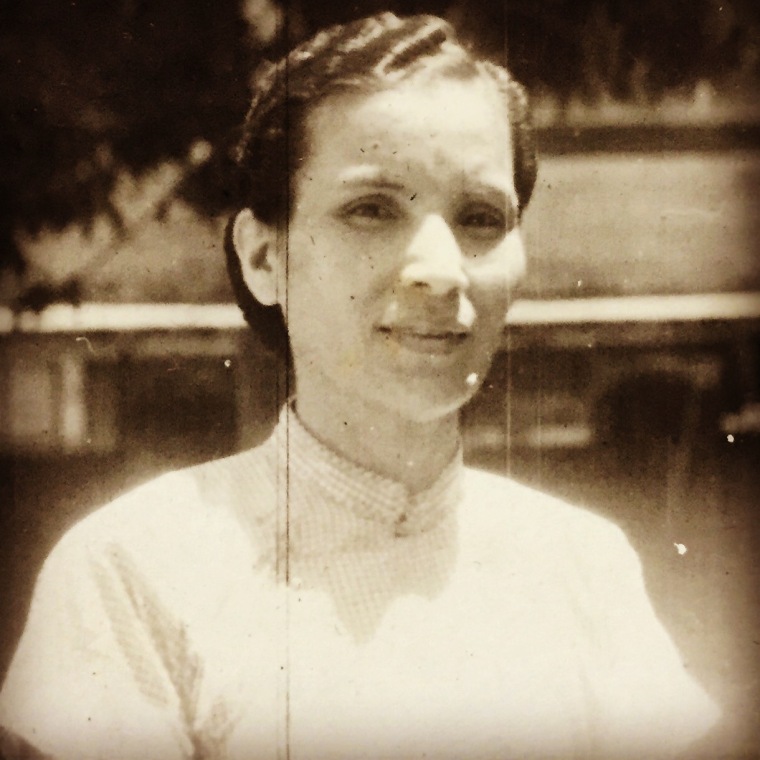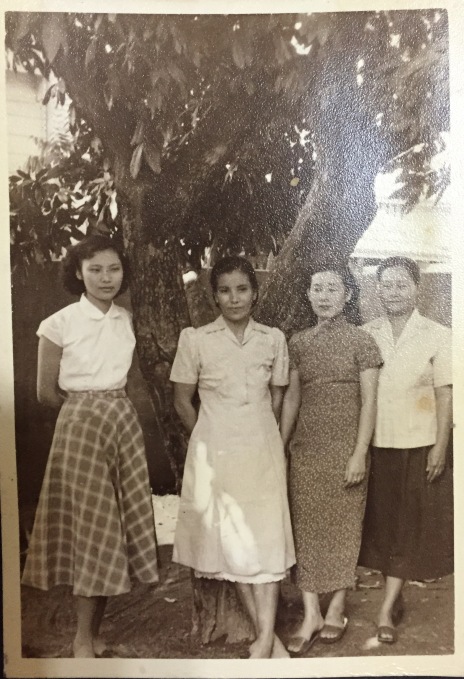
Growing up, my sisters and I called my Japanese grandmother “Katchan,” which is the Japanese word for mother. This is how my parents, aunts and uncles all regarded her. Before I knew the meaning of the word, I thought it was her name.
Katchan was a timeless beauty, with deep set eyes, high cheek bones, and porcelain skin. Her beauty was known everywhere she went. Yet she was an incredibly humble and kind woman, perhaps unaware of how striking she was.
I didn’t get to spend much time with Katchan; my parents immigrated to the US when I was 4 years old and we came back to Taiwan every 3 to 4 years at most. What I do remember is that she was simultaneously a traditional Japanese woman, and also someone who was extremely liberal for her generation. Once, when she came to visit us in California, she accompanied me to the mall. I was a teenager, and wanted to buy a backless summer dress. Katchan didn’t blink and bought me the dress, which my parents later made me return because it was inappropriate by their conservative standards.
The stories I heard about the type of mother she was corroborated this perception. Katchan would rarely tell her children what they should or shouldn’t do. Instead, she would always support them in their pursuits. These are very unusual qualities for an Asian parent – especially one of that era. My father, who is the youngest child, told me that he and his friends would always play Mah Jong at our house – both because Katchan made the best food, and because she was the only mother who allowed it.
When my father decided to move us to America, she never uttered a word of opposition nor tried to convince him otherwise, as most parents might do if their child were to move halfway around the world. This was even more surprising given she had a particularly soft spot for my father, as he was the baby of the family. Later, my maternal grandmother would tell us how Katchan wept with sorrow only after seeing my father and our family off at the airport. It was unusual for anyone to see her cry.
All of this summarizes the kind of person she was – a deeply beautiful spirit. Someone who could hold her profound grief and pain inside, as to not inconvenience others. Someone who never spoke ill words about anyone, no matter how poorly they treated her. Someone who was fiercely strong, who had the courage to make life changing decisions that defied all norms – and never look back, regardless of the outcomes.
One of my older cousins, who grew up in Taiwan, told me that Katchan’s best advice to her as a teenager was to always look forward at the path ahead, rather than holding on to the past. I imagine this wisdom was learned the hard way.
What fascinated me most about Katchan were the stories my eldest aunt would tell me. As a child, I would listen in wonder as my aunt told me about growing up as a half Japanese, half Taiwanese child during the Japanese occupation of Taiwan before World War II, and after the mainland Chinese Kuo Ming Tang party took over the country in 1949.

We would inevitably come to the question of how Katchan had come to Taiwan in the first place. It was very unusual that a young woman who had just finished nursing school in Japan would come to Taiwan on her own (it’s unclear how she found her way to nursing school, given her parents didn’t believe in educating women), and even more unusual that she would marry a Taiwanese man – without telling her parents. In those days, the Japanese were considered of much higher status than the Taiwanese. Inter-cultural marriages were taboo, unless a Japanese person were marrying into money. While my grandfather was a renowned doctor in the hospital my grandmother worked in, he was not a rich man by any standards, making it even more puzzling. Furthermore, the whole family took Katchan’s last name, Tanabe, instead of my grandfather’s during the years Japan occupied Taiwan.
The older I get and the more I’ve come to understand this story, the more bizarre it all seems. And the more I want to understand what drove Katchan to leave her life in Japan behind, and to make the subsequent decisions she did, which seem so out of the ordinary. Each of these decisions has led to me being here today. I’d love to say that Katchan ended up fulfilling her dreams and living happily ever after, but the truth is, she endured a deep and quiet suffering for many years. She experienced extreme abuse from the person she had left everything for, and yet never once uttered a negative word about my grandfather. Despite her strength, at some point, she must have felt life was no longer in her control — for there were dark years where she considered ending it all. Given how courageous, resilient and independent she was, the circumstances must have been dire.
What’s even more interesting is the fact that my aunt would often ask Katchan, “why did you come to Taiwan?” To which Katchan, who was fiercely private, would respond: “I’ll tell you before I die.”
Katchan suffered from a stroke in 1993, when she was 83 years old. She lost a lot of her memory, her mobility, and her ability to speak. She remained in this state for the next 10 years, before she passed away at home in Kaohsiung, Taiwan in 2004.
To this day, the answer to this question remains unknown.